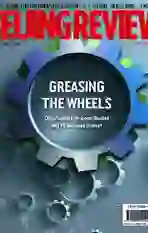SHANGHAI OFFICIAL APOLOGIZES FOR COVID-19 DISRUPTIONS
2022-05-01
SHANGHAI OFFICIAL APOLOGIZES FOR COVID-19 DISRUPTIONS
Nucleic acid screening is one of the most important measures to quickly detect new COVID-19 cases, quarantine those who tested positive and effectively cut off the virus transmission routes, Shanghai Executive Vice Mayor Wu Qing said at a press briefing on April 19.
Wu apologized, saying that adjustments to the nucleic acid screening process had inconvenienced community workers and residents alike, and promised to improve screening quality and efficiency. The results of every testing round will provide further data support to dynamically modify prevention and control strategies in the next step, he added.
The executive vice mayor further stated over 37 million nucleic acid tests had been administered as of April 15, with the citys maximum daily testing capacity reaching 5 million tubes.
Kid-Friendly Food?
Beijing Evening News April 20
Supermarket aisles today brim with appealing packaging targeting the younger appetite. These foodstuffs claiming to be “additive-free” or “helping children grow” are sold at much higher prices than “regular” groceries. And many parents will go the extra financial mile to get their offspring the finest nutrition possible.
But China as of yet features no classification system to separate, register and grade adult and kid foods, meaning there are no national laws, regulations or even just standards in place to vouch for food differentiation. This reality strikes a stark contrast with the parental belief that their kidsmeals underwent much stricter testing than their own.
Nutritional intake directly bears on a childs overall wellbeing. The nation must first introduce strict standards before products targeting the youngest consumers can hit shelves and hold accountable those producers and vendors offering harmful foods labeled as kidfriendly. Finally, then, parents should realize that paying a premium for a better diet may see their children end up paying a much higher price: their health.
Reinvigorating Historic Treasures
Outlook Weekly April 18

Rich in cultural heritage, Shaanxi Province in northwest China must not only protect its historic treasures, but reinvigorate them and create value in the process of their inheritance.
Ready to take on the massive task, the province has decided to combine cultural relic preservation with the improvement of local living conditions by presenting its indigenous customs and unique cultures to the outside world and up its appeal as a tourist destination. For example, age-old terraces today intertwine with village farm life, demonstrating traditional ways of planting rice across a simply stunning scenery.
During peak season, villagers put down their farming tools and become cooks and waiters in the agritainment business; some even stage entire local culture shows for tourists.
Last but not least, the provincial capital of Xian is now home to 158 museums, one for every 82,500 people—much higher than the national average. The areas history is very much alive in modern times.
The Flexi Flock
The Economic Daily April 18
Some 200 million Chinese people today opt for flexible work arrangements, a type of employment playing a crucial role in ensuring the peoples livelihood and social stability.
Flexible employment is no newcomer to the occupational scene, but the rapid rise of the digital economy has lifted it to the next level. New technologies have created numerous newfangled jobs and lowered the threshold for employment. Teleworking and mobile undertakings have provided employees with the opportunity to adapt their time and place of work to their individual needs. People nowadays can enjoy more flexibility in their working hours and methods than before.
Nevertheless, flexible employment remains a more unstable form of employment—possibly here today, gone tomorrow. This work model still requires standardization to help its labor force improve competitiveness to better manage career ups and downs and keep Chinas job market stable.
NEW DEPUTY HEAD OF NPC CONSTITUTION AND LAW COMMITTEE
Ying Yong was appointed deputy head of the Constitution and Law Committee of the 13th National Peoples Congress on April 20.
Ying served as secretary of the Hubei Provincial Committee of the Communist Party of China (CPC) from February 2020 to March this year. He first rose to prominence in 2003 in Zhejiang Province as president of the provincial higher peoples court. He then served as head of the Organization Department of the CPC Shanghai Municipal Committee before becoming deputy party secretary of Shanghai. He assumed the post of mayor of Shanghai in January 2017. In February 2020, Ying was appointed secretary of the CPC Hubei Provincial Committee, at a time when the central Chinese area was hit hard by the outbreak of COVID-19.
Born in 1957 in Xianju, Zhejiang, Ying went on to work for several government organizations in the province since 1976.
“The U.S. is in no position to point fingers at other countries human rights conditions. What the U.S. should do, is face up to its own serious human rights problems, and reflect on how to address the root causes of the deteriorating human rights situation.”
Wang Wenbin, spokesperson for Chinas Foreign Ministry, at a regular briefing on April 18
“When we celebrate the Chinese language, we also celebrate its contribution to cultural diversity, intercultural dialogue, and lasting peace.”
Santiago Mourao, President of the 41st UNESCO General Conference, pointing out that Chinese is the most ancient script still in use during the celebration of the 2022 United Nations Chinese Language Day on April 20
“My concern is that we may experience what happened in the UK, where they drastically pulled back restrictions and subsequently saw a significant surge [in new COVID-19 cases].”
Saskia Popescu, an infectious disease epidemiologist and assistant professor at George Mason University, the U.S., in a recent interview with The New York Times
“Earth is facing a triple planetary crisis. Climate disruption. Nature and biodiversity loss. Pollution and waste. This triple crisis is threatening the wellbeing and survival of millions of people around the world.”
UN Secretary General António Guterres, in his message for World Earth Day, which falls on April 22
